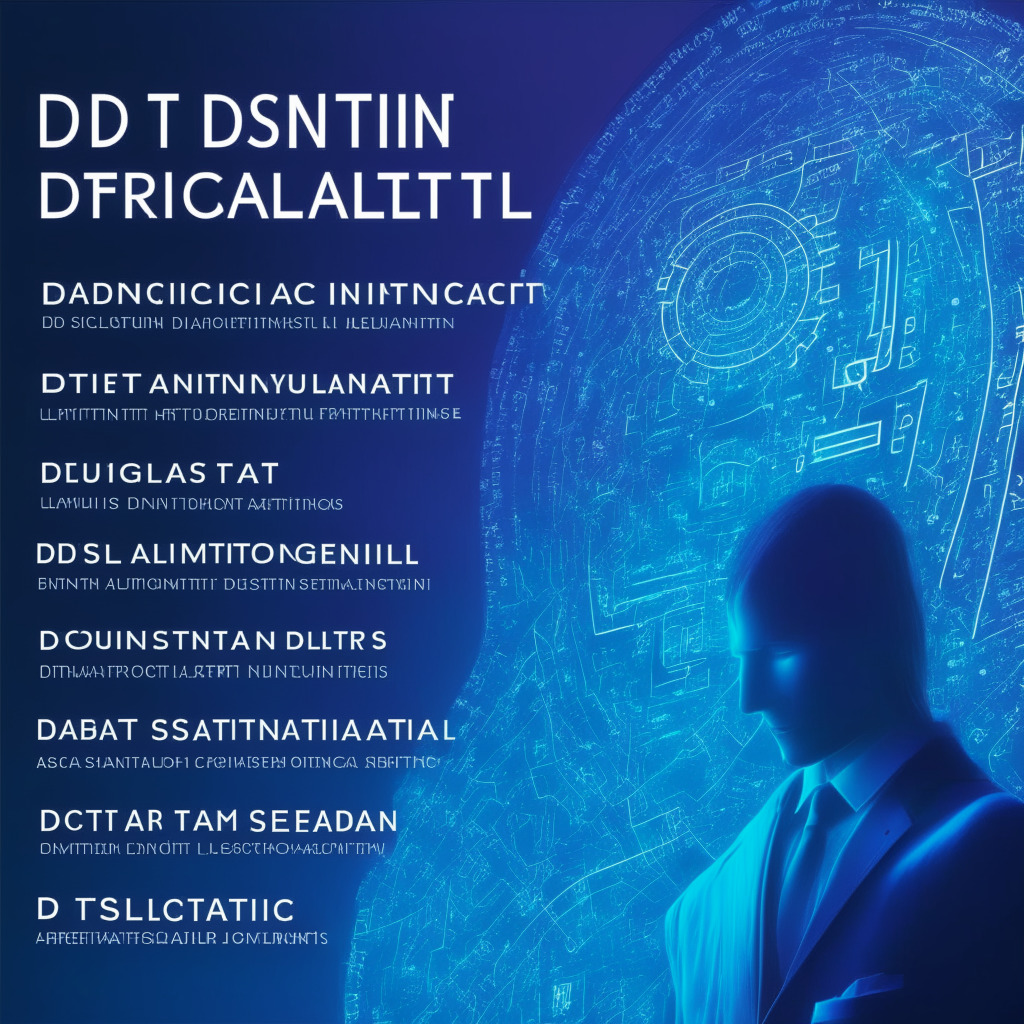The future of blockchain technology holds immense promise in various sectors like finance, supply chain, and real estate, but skepticism and challenges remain. Key concerns include environmental impact, potential centralization of power, and regulatory uncertainties. Its transformative potential and drawbacks will become clearer as the technology evolves and matures.
Search Results for: distributed ledger technology
Blockchain’s Future: Revolutionizing Industries Amid Challenges in Energy, Scalability, and Regulation
This article discusses the pros and cons of blockchain technology, highlighting its enhanced security, transparency, and efficiency. It also addresses challenges such as energy consumption, scalability, and the lack of consistent global regulations.
NYC’s Blockchain Revolution: Balancing Innovation, Risks, and Financial Integration
Blockchain technology is poised to revolutionize industries with its safety, transparency, decentralization, and scalability. 133 W 19th St. in New York City symbolizes the interaction between traditional finance and the emerging blockchain ecosystem, bringing challenges and potentials in integrating digital assets and technologies into existing markets.
US House Committee Seeks Crypto Clarity Amid SEC Contradictions and Offshore Exodus
The U.S. House Financial Services Committee aims to clarify digital asset regulations amid contradictory actions from SEC Chair Gary Gensler. As U.S.-based crypto firms consider moving offshore due to regulatory crackdowns, upcoming hearings will address regulatory gaps and potential coordinated efforts by regulators for “Operation Choke Point 2.0” to de-bank the crypto market.
EU’s MiCA Regulation: Impact on Crypto Assets, Stablecoins and NFTs, and Investor Protections
The European Union is preparing to implement the Markets in Crypto Assets (MiCA) regulation by July 2023, covering crypto-assets and their issuance, trading, and offering. MiCA aims to update the EU with new technologies, introducing stricter rules on stablecoins, increased disclosure obligations for crypto businesses, and implementing anti-money laundering and data security procedures. However, it does not apply to non-fungible tokens (NFTs).
Brazil’s CBDC Pilot: Excluding Crypto Firms Hinders Innovation and Collaboration
The Central Bank of Brazil’s exclusion of crypto-related companies from their CBDC pilot has raised concerns about favoritism towards traditional financial institutions. Critics argue that this decision suppresses potential innovation and collaboration between emerging and established financial systems, hindering integration of digital currencies in the global financial landscape.
The Great Blockchain Debate: Decentralization, Scalability, and Environmental Impact
This article explores the future of blockchain technology, discussing its potential to revolutionize industries through decentralization, smart contracts, and increased transparency. However, challenges like scalability, security, and environmental impact remain, with critics questioning the technology’s trustworthiness and long-term viability.
Global Crypto Regulation Changes: Bans, Influencer Marketing and CBDC Prohibitions
Last week saw significant international developments in cryptocurrency regulations. Argentina’s central bank banned payment providers from offering crypto transactions, while France allowed registered crypto companies to hire influencers for advertising. Nigeria’s SEC may permit licensed exchanges to list asset-backed tokens, the US released a national standards strategy for blockchain, North Carolina prohibited CBDC payments to the state, and Montana protected crypto miners’ rights.
Biden’s Blockchain Focus: Digital Identity, DLT Advancements, and Balancing Privacy
The US government has emphasized the development of critical and emerging technologies, including digital identity infrastructure and distributed ledger technologies (DLT). As blockchain gains significance in the economic landscape, challenges arise in balancing innovation and privacy, while aiming to bolster US competitiveness and maintain a secure digital environment.
Tykhe Block Ventures: Fueling Blockchain Growth or Overheating the Market?
Tykhe Block Ventures recently announced the first close of its Blockchain Growth Fund, backed by ultra-high net worth individuals and family offices in Southeast Asia and the Middle East. The firm plans to invest $10 million in blockchain and Web3 startups in the Middle East and launch a $100 million fund later this year.
Bull Run 2024: Betting Big on Avalanche and Uwerx, The Disruptors of the Blockchain Space
The year 2024 is predicted to bring another big bull run in the crypto markets, […]
Achieving Finality in Blockchain: Irrevocable Transactions, Challenges and Future Prospects
“Finality in blockchain refers to the irrevocable confirmation of a transaction or block of transactions. Achieving finality has challenges like network latency and potential 51% attacks. However, improved security algorithms, consensus algorithms and advanced cryptographic techniques promise faster, more reliable confirmations, and permanence of transactions.”
European Crypto Regulation: Balancing Sustainability, Transparency and Freedom
The European Securities and Markets Authority (ESMA) has published its second consultation paper on cryptocurrency regulations, focusing on sustainable indicators for distributed ledgers, disclosure of insider information, technicalities within white papers, transparency measures and record-keeping for Crypto asset service providers. ESMA’s move aims to encourage a more sustainable, transparent, and accountable crypto-market.
Decoding Blockchain: A Paradigm Shift or Pandora’s Box?
“In the digital finance world, the concept of blockchain technology, offering decentralized digital ledgers, is gaining significant attention. With possibilities extending beyond finance into areas like voting systems and digital identification, blockchain presents potential advantages. However, its volatile nature, security challenges, and regulatory absence present equal risks, prompting the question – are we ready for this double-edged sword?”
Southeast Asian Super App Grab Launches Blockchain Wallet and NFT Vouchers: A Brave Step or Casual Ripple?
Southeast Asian super app Grab, in collaboration with the Monetary Authority of Singapore (MAS), is venturing into the realm of blockchain technology and non-fungible tokens (NFTs). They have unveiled a unique Polygon-based Web3 wallet and NFT vouchers, which serve as digital collectibles and can be used for various services across Singapore. While the project holds promise, questions about its feasibility and the security of these digital assets persist.
London Stock Exchange Paves Runway for Blockchain Integration, Sans Cryptocurrencies
The London Stock Exchange Group is preparing to integrate blockchain technology into its trading procedures for traditional financial assets. This follows a year of research into the feasibility of combining conventional markets with blockchain’s transparent infrastructure. However, the proposed system will exclude cryptocurrencies, focusing on using blockchain to increase efficiency.
Navigating Blockchain Revolution: Potential Boon or Pending Chaos?
“Blockchain technology promises a decentralized future, eliminating intermediaries and promoting transparency, data integrity, and traceability. It’s not without issues: irreversible errors, security vulnerabilities, and high energy consumption. The unclear regulatory landscape poses additional challenges and uncertainties for this potentially revolutionary technology.”
Singapore’s MAS Proposes Digital Money Standards: Exploring Pros, Cons, and Conflicts
The Monetary Authority of Singapore (MAS), in collaboration with the IMF and others, has proposed standards for using digital money on distributed ledgers, including central bank digital currencies (CBDCs) and tokenized bank deposits. The protocol addresses programmability, balancing innovation, and regulation to ensure digital money serves as a medium of exchange without compromising financial stability and user experience.
AI & Blockchain Revolutionize Parametric Insurance: The dRe Lifecycle Dashboard Debuts
Arbol and The Institutes RiskStream Collaborative have introduced the dRe Lifecycle Dashboard, an AI and blockchain-driven parametric insurance platform. The smart contract-based system automates claims, enhances transparency, and utilizes data from dClimate and Chainlink’s oracle network for parametric loss calculations in severe storm catastrophe transactions. The platform’s adaptability positions it as a game-changer in the insurtech landscape.
Digital Assets Lagging Behind Nasdaq: Diving Deep into Regulatory and Technological Impacts
Despite digital assets lagging behind the Nasdaq stock index, blockchain technology and tokenization are anticipated to significantly transform various sectors in the next 5-10 years. Balancing investor protection and fostering innovation will be key to shaping the future of digital assets and the blockchain ecosystem.
Crypto Market Growth and Challenges: Sustainability, Influence, and Security Concerns
In this article, we explore the blockchain future, discussing technology, market trends, and safety while incorporating informed skepticism. We cover the cryptocurrency market’s growth, the influence of figures like Elon Musk, and blockchain technology’s potential benefits and pitfalls, as well as security concerns in decentralized finance.
Blockchain Future: Unlocking Potential and Addressing Concerns in a Decentralized World
In this article, the significant impact of blockchain technology on the decentralized future is discussed, highlighting its potential for revolutionizing businesses, enhancing security, and improving financial landscapes. However, concerns regarding environmental impact, regulation, and overhype are also addressed, emphasizing the need for responsible development and implementation.
University of Toronto Joins Ripple’s Blockchain Initiative: Pros, Cons, and Impact on Crypto Industry
The University of Toronto collaborates with Ripple to launch an XRP ledger validator as part of Ripple’s University Blockchain Research Initiative (UBRI) in Canada. This partnership aims to support blockchain and crypto technology research and provide students with opportunities to develop skills for crypto-native careers.
Blockchain Innovation & Regulation: Striking the Balance for US Leadership in Web3
The House Energy and Commerce Committee Subcommittee discussed blockchain technology and the future of Web3, addressing non-financial use cases such as contract tracing for Covid-19, data security, and supply chain management. However, lack of regulatory clarity and the focus on financial applications pose challenges to fostering innovation and retaining top talent in the US.
Cryptocurrency Market Tug of War: Regulatory Uncertainty vs Increasing Adoption
The cryptocurrency market faces a tug of war between regulatory uncertainty and increasing adoption, with mixed results for key cryptocurrencies like Bitcoin and Ethereum. As enthusiasts, it’s crucial to monitor price fluctuations and consider factors such as potential regulatory crackdowns and industry adoption of blockchain technology.
Blockchain’s Future: Revolutionary Potential vs Adoption Challenges and Environmental Impact
The future of blockchain technology is bright, offering transparency, security, and decentralization in various sectors like finance, healthcare, and supply chain. However, challenges such as energy consumption, regulatory uncertainties, and market volatility raise concerns about mass adoption and mainstream use of blockchain.
Exploring CBDCs for Seamless Cross-Border Transactions: Potential and Challenges
The New York Federal Reserve and Monetary Authority of Singapore’s joint research suggests that Central Bank Digital Currencies (CBDC) operating on different networks could enable cross-border and cross-currency payments with near real-time settlement finality. This development highlights the potential for a transformative shift in global finance.
Synergy Between Bitcoin and PoS Blockchains: Exploring Security and Energy Implications
Stanford professor David Tsè reveals research on synergy between Bitcoin and proof-of-stake blockchains, addressing PoS limitations and energy consumption implications. By protocol-sharing security, overall strength can be boosted. Bitcoin’s “long-range” security complements PoS, attracting developers for distributed ledger applications and NFTs, offering potential for a symbiotic blockchain future.
EU’s DAC8: Balancing Crypto Tax Regulation and Anonymity—Pros and Cons Explored
The European Council approved the Directive on Administrative Cooperation 8 (DAC8) which expands tax reporting requirements to include crypto asset transfers. This move strengthens the EU’s Anti-Money Laundering regulations and enhances their ability to combat tax fraud, evasion, and avoidance in the rapidly growing crypto-asset sector. However, it may also impact the freedom and anonymity of digital assets.
Blockchain’s Future: Revolutionizing Industries or Exacerbating Environmental Concerns?
Exploring the pros and cons of blockchain technology, this article discusses its potential to revolutionize industries, offering transparency, security, and decentralization. However, concerns include energy consumption, regulatory oversight, and potential misuse. The debate between innovation and skepticism shapes the future of this rapidly evolving technology.
Decentralization vs Security: Unearthing the Blockchain Debate and its Impact on Industries
This article explores the potential of blockchain technology with its decentralized nature and ability to revolutionize sectors, while discussing skeptics’ concerns about hacking, scalability, and environmental impact. The future of blockchain remains uncertain but holds immense promise if challenges are overcome.
SEC Drops Digital Asset Definition: Implications for Crypto Regulation and Investment
The SEC recently finalized new Form PF rules but chose not to adopt the previously proposed definition of “digital assets,” leaving the crypto community navigating a landscape of regulatory uncertainty regarding assets based on distributed ledger or blockchain technology.































